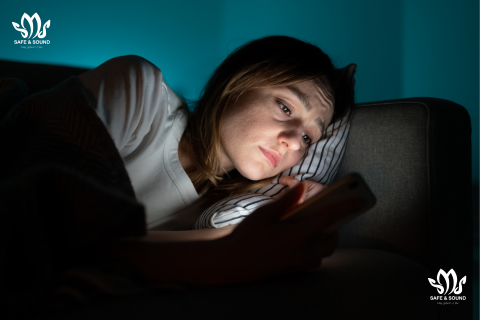Insomnia From Stress: 7 Bad Habits That Make It Harder for You to Sleep | Safe and Sound
When the mind cannot relax, the body easily falls into a state of prolonged stress, causing sleep disorders. Many people seek measures to improve this condition but do not realize that their daily habits are the cause of more serious sleep effects. So when you have insomnia due to stress, which bad habits make it harder for you to sleep? Let's find out with Safe and Sound's psychological experts in the article below.
Ngo Thi Sang | Master of Educational Psychology – Applied mental health care Safe and Sound
Institute of Medical Technology Applications
1. Using your phone or electronic devices before bed

Using your phone or electronic devices before bed
One of the most common causes of insomnia due to stress is the habit of using phones, tablets or watching TV right before going to bed. Blue light from the screens of electronic devices can inhibit the production of melatonin - the hormone responsible for regulating the body's sleep-wake cycle. Psychologists say that when melatonin levels are reduced, the body cannot receive sleep signals, leading to a state of prolonged tossing and turning. Not only that, content on the phone such as news, social networks or movies can stimulate the brain, making you more awake instead of relaxing. This is the reason why many people feel mentally tired but still cannot fall asleep when going to bed. If this condition persists, it can cause chronic sleep disorders, causing the body to be exhausted and reducing work performance during the day.
Solution:
- Limit phone use at least 30 - 60 minutes before bed.
- If you need to relax mentally, read a paper book or listen to soft music instead of surfing social networks.
- Enable Night Shift (iPhone) or Blue Light Filter (Android) to reduce blue light when using your phone at night.
2. Drink coffee or tea in the evening
Psychologists say caffeine is a powerful stimulant that can stay in the body for 6-8 hours after consumption. This means that if you drink a cup of coffee late in the afternoon, it can still be active in the blood when you go to bed. Caffeine has the ability to block adenosine - a chemical that makes the body feel sleepy - thereby making the brain more alert. Psychologists warn that for people who are sensitive to caffeine, even a small amount can affect sleep quality, making it difficult for them to fall asleep or sleep deeply. Consuming caffeine too close to bedtime can also disrupt the biological rhythm, causing the body to gradually get used to being awake in the evening and mentally tired during the day, creating an unwanted vicious cycle.
Solution:
- Limit drinking coffee or tea after 2:00 p.m. to avoid affecting sleep.
- If you need a warm drink in the evening, try chamomile tea, warm milk or warm water with honey, these drinks help relax the mind and aid sleep.
3. Eating too much or eating spicy food at night

Eating too much or eating spicy food at night
Eating dinner too late or consuming spicy, greasy foods before bed can also cause sleep problems, especially when you are suffering from insomnia due to stress. According to psychologists, when you eat a large meal at night, the digestive system has to work hard to process the food, which can make it impossible for the body to relax and fall asleep easily. In particular, spicy foods can increase body temperature, cause sweating and make you feel uncomfortable when lying down. For people with gastric reflux, eating too much at night can also lead to acid reflux, causing a burning sensation in the chest and waking them up in the middle of the night. If this condition persists, sleep quality will be seriously affected, causing psychological fatigue, stress and lack of concentration the next day.
Solution:
- Avoid eating dinner too late, it is best to eat before 7:30 pm - 8:00 pm.
- If you're hungry before bed, snack on almonds, a banana, or yogurt, which provide tryptophan – a natural melatonin-stimulating chemical.
4. Sleeping at the wrong time, irregular sleep schedule
The human body operates on a natural circadian rhythm, in which sleep and wakefulness are regulated by day and night cycles. Psychologists say that if you frequently change your bedtime, such as sleeping late on weekdays and sleeping in on weekends, your circadian rhythm can be disrupted, making it difficult for you to maintain a stable sleep pattern. Irregular bedtimes prevent your body from producing melatonin consistently, which makes it take longer to fall asleep or sleep less deeply. Over time, this can lead to chronic insomnia, which negatively affects your physical and mental health: fatigue, stress, memory loss, reduced ability to concentrate, and increased risk of cardiovascular disease and blood pressure.
Solution:
- Go to bed and wake up at the same time every day, even on weekends.
- If you want to adjust your bedtime, change it slowly, 15-30 minutes earlier or later each day to allow your body to adapt.
5. Vigorous exercise or exercise close to bedtime

Exercise or strenuous activity close to bedtime
Exercise is a good habit to improve overall health, but if you exercise too close to bedtime, it can make it harder for you to relax and fall asleep. Psychologists share that when you exercise vigorously, your body produces adrenaline and cortisol - two hormones that help increase alertness and energy. This can cause sleep disorders, especially when you exercise intensely like jogging or lifting weights. In addition, the increased body temperature after exercise also makes you feel uncomfortable and takes longer to fall asleep. Therefore, psychologists advise that if you want to maintain good sleep, you should exercise in the morning or at least 3-4 hours before going to bed so that your body has enough time to relax.
Solution:
- It is best to exercise in the morning or afternoon, avoid exercising close to bedtime.
- If you need to relax before bed, try gentle yoga or deep breathing exercises, which can help reduce stress and make it easier to fall asleep.
6. Bring work to bed
According to psychologists, many people have the habit of working right in bed or bringing computers and documents to do work in the evening. This can cause the brain to associate the bed with work instead of a place to relax. When you think too much about work, the body will secrete cortisol, increasing stress levels and reducing the ability to relax mentally before going to bed. Over time, this can disrupt sleep, making you feel exhausted during the day. To overcome this situation, psychologists suggest that you separate your work and rest spaces, and spend at least 30 minutes before going to bed to relax, read a book or do breathing exercises to help your body get ready for deep sleep.
Solution:
- Clearly divide working space and sleeping space.
- Avoid bringing laptops and documents to bed. Only use the bed for sleeping and resting.
.png)
7. Thinking too much before going to bed
Anxiety, overthinking, or reminiscing about past events can keep your brain in a constant state of activity, making it difficult for you to relax and sleep well. When stress increases, your body produces more cortisol, increasing feelings of anxiety, fatigue, and reducing sleep quality. This condition, if prolonged, can lead to chronic insomnia and seriously affect your mental health. One way to control your thoughts before bed is to practice mental and physical relaxation exercises such as meditation, deep breathing, or journaling to relieve anxiety and stress in your mind.
Solution:
- Write down your thoughts or to-dos in a notebook before bed to "free" your mind.
- Make a habit of meditating or practicing deep breathing exercises to relax your mind.
Safe and Sound Clinic - Family health and psychological support
With a team of experienced doctors and specialists, Safe and Sound Clinic is a pioneer in comprehensive health care with health care services from medicine to psychology.
“Early prevention - Timely support - Long-term companionship”.
If you have any doubts or experience any physical or mental health problems, please contact HOTLINE 0964 778 911 (Phone/Zalo, 24/7) for answers and support as soon as possible!
HOW TO MAKE AN APPOINTMENT for online or in-person consultation with an expert
- At SnS Clinic - IMT Institute
- Or download and schedule a consultation on the Safe and Sound app to manage and track your schedule anytime, anywhere.
Safe and Sound (SnS) - Institute of Applied Medical Technology (IMT)
See also:
- 5 breathing exercises to help reduce stress and cure insomnia
- What is depression? Symptoms of depression. Can depression be cured?




